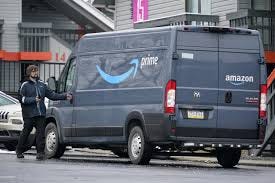First Came the Bag Tax, then the Rain Tax, and Now Comes the "Delivery Tax"
Maryland Governor Wes Moore Proposes New "Delivery Tax"
Maryland Governor Wes Moore's proposed new "Delivery Tax" represents a misguided response to the state's budget deficit. This new tax—a 75-cent fee on delivery orders from businesses such as Amazon and DoorDash—aims to generate new revenue.[i] However, the tax would burden consumers and undermine economic competitiveness. It repeats the mistakes of past Maryland Democratic tax experiments like the infamous O'Malley "Rain Tax."
The delivery tax is marketed as a fee for big corporations. But Marylanders understand fully that the costs will be passed on to them as an additional expense. In short, Marylanders who once enjoyed free delivery will not anymore. And at a time when inflation continues to strain household budgets, the new 75-cent fee will add yet another expense for basic conveniences—like groceries, meals, and essential goods.
Small businesses that rely on delivery services to reach customers will face increased costs and lose business. The tax will make competing harder in an already challenging economic climate. Local entrepreneurs could see reduced demand as customers balk at higher delivery charges.
The Tax Foundation already ranks Maryland poorly in terms of tax competitiveness compared to other states. Maryland's heavy tax burden and high cost of living place it at a significant disadvantage in attracting businesses and residents. For instance, in the Tax Foundation's 2025 State Business Tax Climate Index, Maryland ranked a dismal 47th out of 50 states. This ranking underscores the state's unfavorable tax environment, driving businesses and individuals to relocate to more tax-friendly neighboring states like Delaware, Pennsylvania, Virginia, and West Virginia.[ii]
Governor Moore's broader budget plan includes additional measures like doubling vehicle emission inspection fees and eliminating title tax allowances for higher-priced vehicles. While these initiatives aim to close Maryland's projected budget gap and fund transportation spending, they burden middle-class families and small businesses more heavily.[iii]
Other states are thriving with budget surpluses and implementing tax cuts. Delaware ended its fiscal year with a $546.2 million surplus, West Virginia reported an $826.6 million surplus, and Virginia is anticipating a $2 billion surplus. These states have prioritized tax relief and economic growth, making them far more attractive to businesses and residents.[iv]
U.S. Census Bureau data already finds Virginia is the top relocation choice for Marylanders leaving the state. This trend highlights the consequences of Maryland's increasingly burdensome tax policies and the need for a more competitive approach.[v]
Governor Wes Moore's Delivery Tax proposal is eerily reminiscent of former Governor Martin O'Malley's "rain tax," the stormwater management "fee" introduced in 2013. The rain tax was imposed on property owners to address environmental mandates. It faced widespread backlash and symbolized government overreach. Due to its unpopularity and limited effectiveness, the rain tax was repealed in 2015 after Larry Hogan was elected Governor. Maryland lawmakers should heed the lessons of the past and avoid repeating policies that disproportionately burden residents.
The Tax Foundation warns that new tax hikes will exacerbate Maryland's competitiveness problem. Other states are lowering taxes to attract jobs and residents. For example, nine states—including neighboring West Virginia —are cutting income tax rates in 2025.[vi] By contrast, Maryland's reliance on higher taxes pushes people and businesses out, further eroding the state's tax base.
This year's tax reductions were not an outlier to recent trends. Beginning in 2021 and continuing into 2023, 48 states and the District of Columbia have cut taxes. The only holdouts are Alaska and Nevada. In total, 29 states and DC passed a tax cut in 2021, 35 states and DC cut taxes in 2022, and 32 states reduced taxes in 2023. Maryland taxpayers benefited from a tax reduction initiated by then-Governor Larry Hogan in 2022.[vii]
Instead of a Delivery Tax, Maryland Governor Moore should follow fiscal policies that work. The Governor should encourage economic growth by postponing further new spending for the State Teachers Union’s “Blueprint” plan.
Maryland has an opportunity to address its budget challenges while promoting economic prosperity. However, Governor Moore's reliance on tax hikes will only exacerbate the state's fiscal woes and harm its residents. The Delivery Tax is a step in the wrong direction that Maryland cannot afford to take.
[i] https://marylandmatters.org/2025/01/16/tax-cuts-increases-part-of-moores-growth-agenda/; https://www.washingtonpost.com/dc-md-va/2025/01/15/maryland-transportation-budget-delivery-fees/]
[ii] 2025 State Tax Competitiveness Index | Full Study, https://taxfoundation.org/research/all/state/2025-state-tax-competitiveness-index/
[iii] https://www.washingtonpost.com/dc-md-va/2025/01/15/maryland-transportation-budget-delivery-fees/
[iv] https://www.baltimoresun.com/2024/12/18/maryland-struggles-with-budget-deficit-while-neighbor-states-bask-in-surplus/
[v] https://virginiarealtors.org/2024/11/06/more-people-moved-to-virginia-than-out-of-the-state-last-year/
[vi]https://www.cbsnews.com/news/tax-2025-states-cutting-income-taxes-january-1-heres-where/
[vii] https://taxpolicycenter.org/taxvox/three-years-state-tax-cuts





